In this article:
In today’s very big world of hair care, the product choices can be overwhelming. From choosing the type of product (conditioners, serums, oils, or gels) to checking for the ingredients you want in it, shopping for hair products can be a tiring and never-ending process.
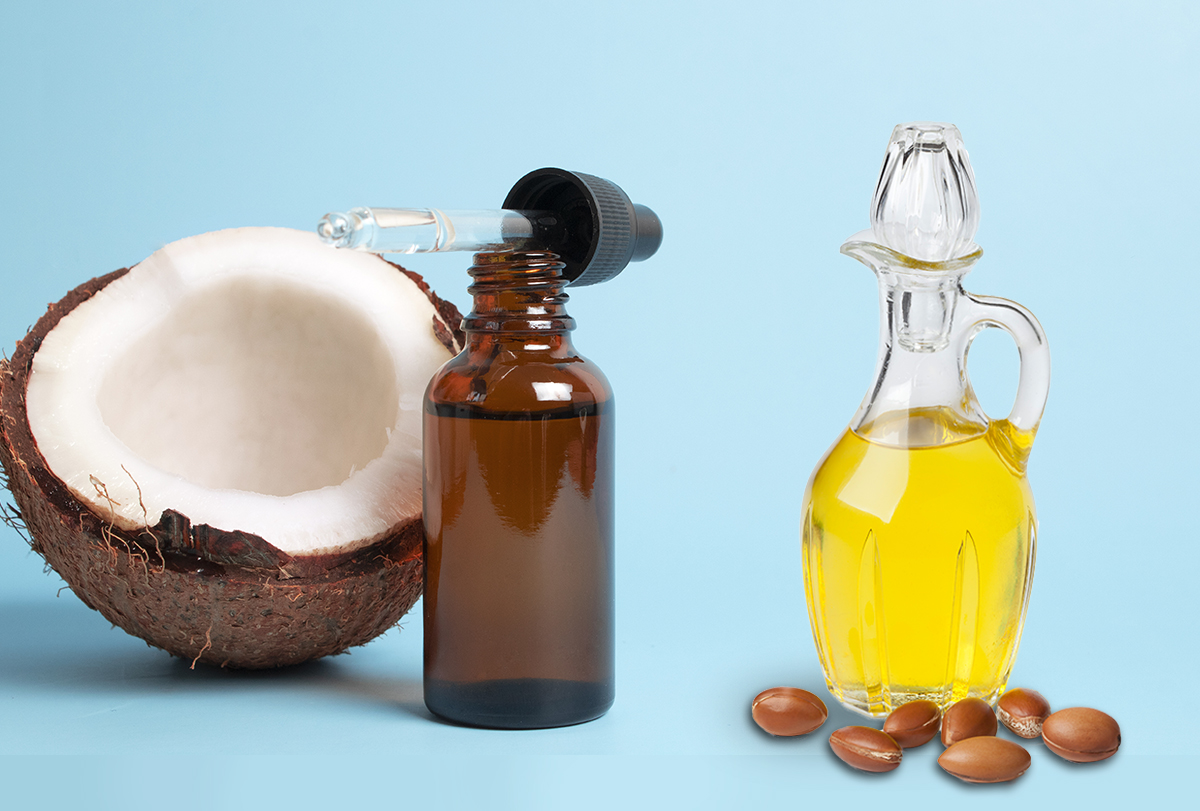
The good news is this article will help you, step by step and little by little.
This article will talk about two very famous hair oils – argan oil and coconut oil. Both oils claim to do wonders for your hair, but which one should you choose?
Since both these oils are exceptionally good, neither is better than the other. To make a correct and informed decision, you need to take into account a lot of factors related to your hair.
This article will lay down all these factors, which you can go through so you can then pick the oil that ticks all the boxes for you.
Argan Oil or Coconut Oil: Which One Should You Choose for Your Hair?
When deciding which oil is better for your hair, you have to consider these hair factors.
1. Hair type (dry versus oily hair)
For dry and frizzy hair, coconut oil is the way to go! With a rich nutritional profile and abundant in compounds such as fatty acids, this oil is a great agent for fighting hair dryness.
According to researchers, the emollient property of coconut oil enables it to form a covering on the hair strands that entraps moisture so that the hair remains hydrated. (1)
Argan oil also is great for moisturizing the hair and may work better for oily hair as it has sebostatic properties. This means argan oil regulates the production of sebum (natural oil) on the scalp, which can help hair greasiness. (1)
2. Hair texture
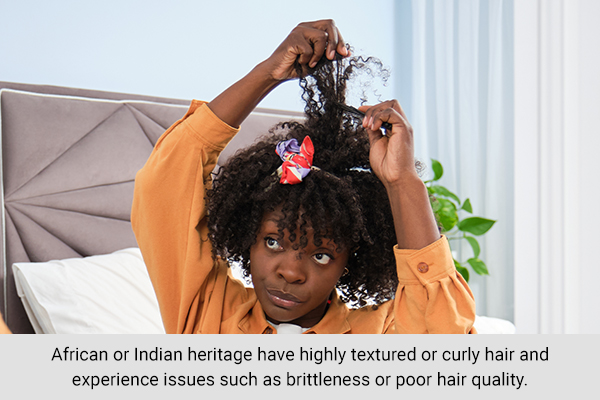
Many people struggle with hair problems that are associated with their hair texture. For instance, those with African or Indian heritage have highly textured or curly hair and experience issues such as brittleness or poor hair quality.
According to a study published in the Journal of Drugs in Dermatology in 2022, there is clinical evidence supporting the use of coconut oil for certain textured hair-related concerns. (2)
Argan oil, however, does not seem to be that useful in enhancing the quality or treating issues related to textured hair, according to the study. (2)
3. Damaged hair
Both argan oil and coconut oil can be incredible in supporting the health of damaged strands. Hair damage can be due to many reasons including sun exposure, chemical use, and heat styling, all of which can be prevented and treated by oiling the hair.
In recent years, argan oil has become increasingly popular in hair care products. This is because research has proven the protective effects of argan oil pretreatment on damaged hair. (3)
At the same time, coconut oil is a natural wonder when it comes to repairing damaged hair. A study showed that coconut oil significantly reduces protein loss in damaged hair, whether used as a pre-wash or post-wash hair care product. (4)
4. Dandruff problems
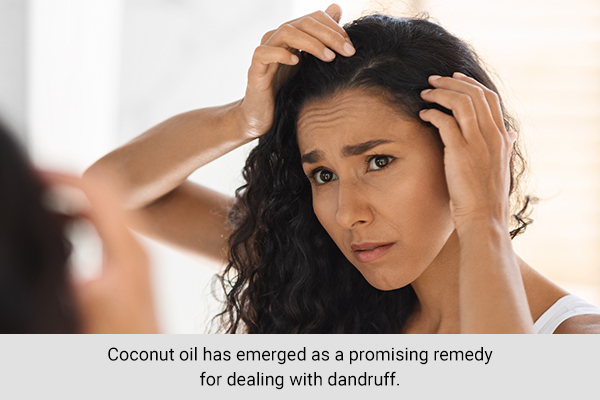
Coconut oil has emerged as a promising remedy for dealing with dandruff.
In a study, there was a significant increase in the number of microbes including Cutibacterium acnes and Malassezia globosa in the scalp of those suffering from dandruff after the coconut oil treatment.
These microbes are considered to be good for hair health as these beneficial bacteria and fungi corresponded with a reduction in dandruff severity. (5)
5. Hair growth
Hair growth can be supported by the regular use of either of the two oils. Both oils have incredible properties that enable hair growth, (1) and thus your choice can depend on your personal preference.
If your hair growth is hindered by dandruff or dryness, coconut oil may be better, but if you have oily and greasy hair, argan oil may be the way to go.
6. Hair color protection
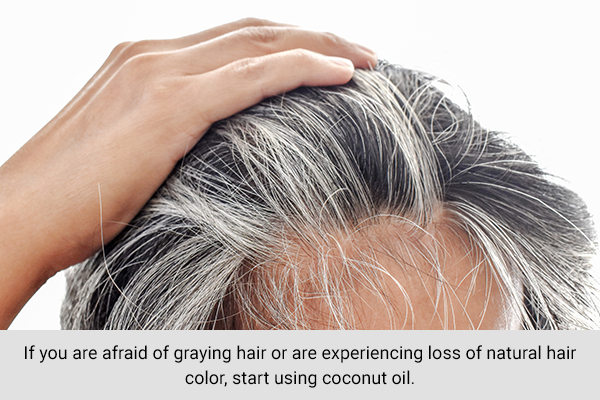
Everyday hair damage from the use of chemical hair products or due to other reasons can harm hair health and accelerate hair graying.
If you are afraid of graying hair or are experiencing loss of natural hair color, start using coconut oil. Research has shown that coconut oil helps prevent hair color from fading.
Upon measuring color intensity, scientists observed better hair color retention in those who use coconut-based hair products. (6)
7. Hair porosity
Low-porosity hair can be linked to various problems because low porosity means tightly sealed cuticles that inhibit the absorption of hair products.
However, the notable penetrative property of coconut oil, because of its small molecular size, makes it a game-changer for people with low-porosity hair. (1)
Moreover, coconut oil has an impressive nutritional composition, which makes it a perfect choice for people dealing with low-porosity hair issues. (1)
8. Psoriasis
Psoriasis is an inflammatory problem that can harm the skin of your scalp. It causes the development of itchy and painful patches on the scalp.
Because of its amazing anti-inflammatory and antioxidant activities, argan oil is a great and effective remedy for psoriasis. (7)
How to Perform Hair Oiling Effectively?
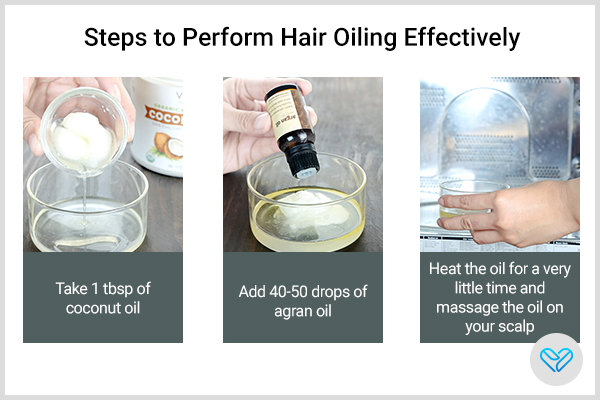
To oil your hair effectively, follow these steps:
- Choose coconut or argan oil based on your hair type and needs.
- Heat the oil for a very little time so that it’s warm but not too hot.
- Massage the oil on your scalp. Cover the entirety of your scalp.
- Let it sit for some time and then wash it off.
Most-Asked Questions
Can I have an allergic reaction to hair oils?
Yes, allergic responses to hair oils are possible. For example, people with nut allergies may experience allergies to almond oil.
When do I shampoo my hair – before or after oiling?
Hair oil can make the hair look greasy and cause product buildup, so always wash your hair after oiling.
Final Word
In the diverse world of hair care, choosing between argan oil and coconut oil can be a matter of personal preference and hair needs. Both oils offer unique benefits, making them valuable additions to your hair care routine.
- Was this article helpful?
- YES, THANKS!NOT REALLY


